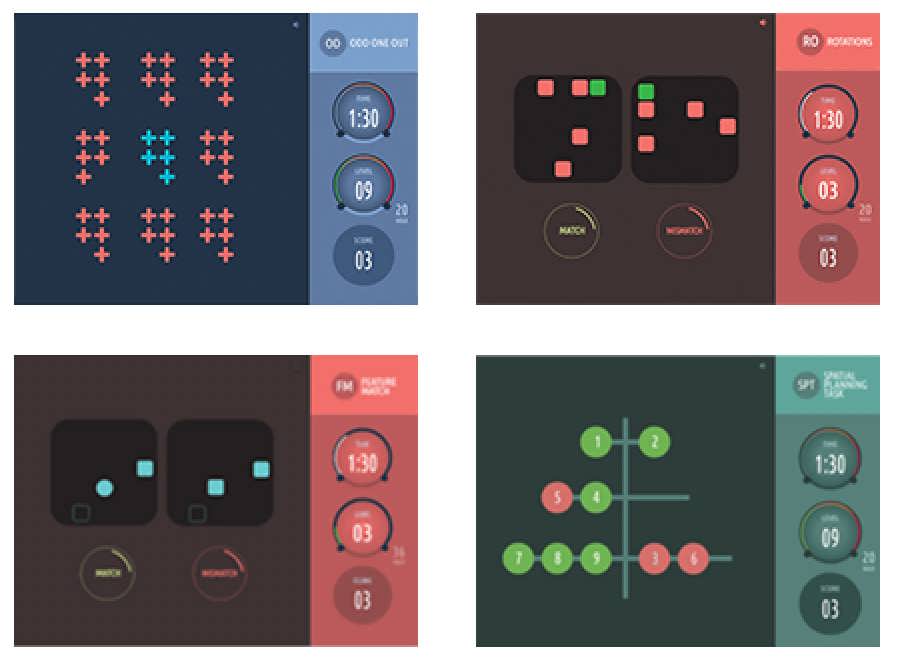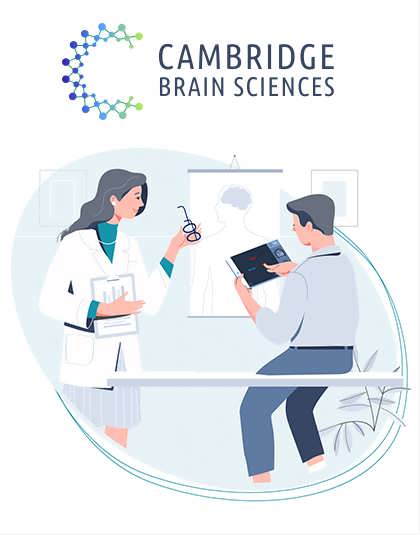PILOT STUDY : QUALIA MIND
Cambridge Brain Sciences
IMPROVING REASONING, EPISODIC MEMORY, VERBAL ABILITY AND CONCENTRATION
Neurohacker Collective recently began a pilot study using the CBS Health platform powered by Cambridge Brain Sciences (CBS) — a leading provider of cognitive testing tools—to help customers receive quantitative feedback on their current brain health. In the initial pilot study, customers were self-selected and offered free cognitive testing with the purchase of Neurohacker Collective’s nootropic, Qualia Mind.
All participants were new Qualia Mind customers who purchased the product through the Neurohacker website between April 15, 2018 and May 25, 2018. Participants were asked to take the CBS battery of 12 assessments before taking Qualia Mind for the first time, the same day as first dose, and after 5 days from first dose. The tests were taken unsupervised via CBS’s online tool. After taking the final assessment, participants were asked to take a short survey to record product usage data to ensure they were taking the product according to usage instructions. There was no placebo control group. The individual score increases listed have been determined to be statistically significant due to having a less than 5% chance of resulting from random variation. Given that this study did not have a placebo control, we cannot conclusively determine whether or not Mind is the cause of the increased scores. Further placebo controlled studies will be required.

THE RESULTS
The results for the 23 eligible subjects revealed meaningful improvement in core cognitive areas of reasoning, verbal ability and concentration. After 5 days of taking Qualia Mind, participants saw:

85.4% increase in scores to measure ability to concentrate/avoid distraction

37.2% increase in scores for planning skills

31.1% increase in scores for visual representation

16.9% increase in scores for verbal reasoning

13.3% increase in scores for verbal short-term memory
PRELIMINARY DATA FROM COGNITIVE TESTING OF QUALIA MIND CUSTOMERS
Open-label • Tests completed prior to taking Qualia Mind, after first dose, and after 5 days on Qualia Mind.
Verbal Ability & Cognition
Core Cognitive Area
Outcome Measure
Verbal Resoning
Memory
Concentrate / Avoid Distraction
(%)
16.9%
13.3%
85.4%
Expected Learning
Effect 2 (%)
2.2%
1.3%
4.9%
Outcome Description
Ability to quickly understand and make valid conclusions about verbal concepts
Ability to temporarily store information in a specific order in short-term
Ability to concentrate on relevant information despite distracting
Reasoning & Memory
Core Cognitive Area
Outcome Measure
Visual
Representation
Planning
Episodic Memory
(%)
31.1%
37.2%
10.2%
Expected Learning
Effect 2 (%)
5.4%
3.8%
-0.4%
Outcome Description
Ability to efficiently manipulate mental representations of objects
Ability to act with forethought and sequence behavior to reach specific goals
Ability to remember and recall specific events, paired with the context they occurred
1 Changes in Cambridge Brain Sciences (cambridgebrainsciences.com) testing scores after 5 days of Qualia Mind in 23 subjects as compared to tests taken before taking Qualia Mind. Score increases have p≤0.05.
2 Expected learning effect is the amount of change in scores because of repeated testing. Values found in: Hampshire et al., Fractionating Human Intelligence, Neuron (2012), http://dx.doi.org/10.1016/j.neuron.2012.06.022

ABOUT CAMBRIDGE BRAIN SCIENCES
Cambridge Brain Sciences is a leading online brain health assessment platform. Their assessments of brain function and brain health have been taken millions of times and used in over 300 studies published in leading academic journals over the last 25 years. Cambridge Brain Sciences is headquartered in Toronto, Canada and has helped hundreds of thousands of people from 75+ countries gain greater insight into their brain health every day. Visit cambridgebrainsciences.com to learn more.
Note: For those of you familiar with Cambridge Brain Sciences testing, you’ll note that there’s a total of 12 different assessments offered. We had the participants of this study do all 12 assessments but have only published the results of 6 of the assessments. The other 6 tests did not show large enough differences to have a high confidence margin in the results.
